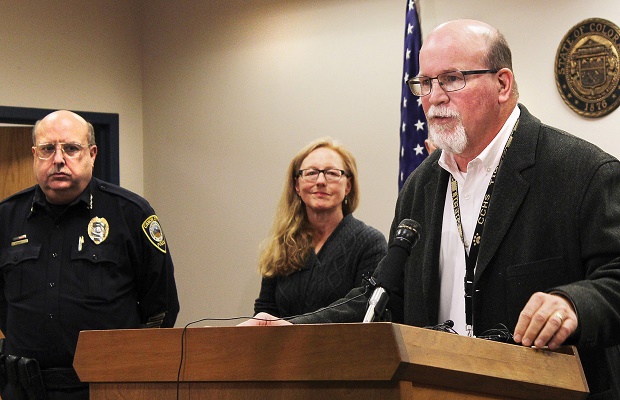Old laws collide with digital reality in teen sexting cases

In this Nov. 6, 2015 file photo, Canon City Police Chief Paul Schultz, left, and Crime Prevention Coordinator Jen O’Connor listen as Superintendent George Welsh talks about a sexting scandal at Canon City High School during a news conference in Canon City, Colo. Across the US, laws from the pre-smartphone era are increasingly colliding with the digitally saturated reality of today’s schools. AP FILE PHOTO
CANON CITY, Colorado — When school officials in a rural Colorado community learned local students were collecting naked photos of one another, they say they had no choice but to notify the police and hand over hundreds of intimate images to law enforcement.
The law in Colorado and many other states classifies any explicit photos of minors as child pornography, and requires school employees to bring in police the moment they learn of it. Prosecutors are looking for evidence of coercion and to see if any adults were involved, saying they don’t intend to file criminal charges against everyone.
Across the US, laws from the pre-smartphone era that were intended to protect children from sexual predators collide with the digitally saturated reality of today’s teens.
Last year in North Carolina, two dating teens who exchanged nude selfies at the age of 16 were charged as were adults with a felony — sexual exploitation of a minor. Those charges were later reduced to misdemeanors following a public uproar.
READ: US police: Boys, 14, recorded, texted sex video; 20 suspended | Sexting scandal shocks US high school
Article continues after this advertisementThis week, two 14-year-old boys in New York were charged after one of them was accused of recording the other having sex with a girl. As many as 20 students were suspended from another school, although not criminally charged, for watching it or sending it to friends.
Article continues after this advertisementAnd last week, 16 students in Tennessee were charged with sexual exploitation of a minor after exchanging explicit photos on their cellphones.
Canon City School superintendent George Welsh said laws intended to protect youth from sexual predators have put the school in a bind. School officials say they can’t even offer counseling to students in the case, because they would have to report those otherwise confidential conversations.
“You see the mess we’re in, you know? So we have to watch out for the mental health needs of our children, yet we’ve kind of got a structure whereby they would be nuts to come and talk to us about it,” Welsh said.
Students hid at least some of the photos using an app that looks like a calculator, and punched a series of numbers to reveal them. Prosecutors say their intent is not to file criminal charges against all the students, but rather to look for any adults or coercion involved.
Some students think the school overreacted, since older teens can legally have sex in many circumstances, even if sending and receiving explicit photos is illegal.
More than a dozen states have reduced the penalties for sexting teens in recent years, but most still treat teens as adults when it comes to possessing child pornography, possibly even labeling them as sex offenders.
Canon City High School student Elizabeth Ellis, 18, said she believes teens will continue to share explicit images via cellphone no matter what the school does.
“We’re not the only high school that does it, and we’re not going to be the only one that gets found out,” she said.
Some teens, parents and legal experts say law enforcement has to see the larger picture. One study found that 28 percent of teens sext, and child advocates warn against harsh measures for those who are caught.
Jeff Temple, an associate professor and psychologist at the University of Texas Medical Branch at Galveston who did the study, sees sexting as a new form of flirting and said it mostly happens between teens who are in a relationship or want to be.
Distributing photographs to others or coercing people to share explicit photos of themselves is more serious and could merit a tougher response, he said.
Potentially allowing the entire world to see your most intimate photos is a real danger, but not one that should be punished criminally, said Marsha Levick, deputy director and chief counsel for the Juvenile Law Center in Philadelphia.
“Sexting is a pretty dumb thing to do, but so is having sex at 14 in your parents’ basement,” she said.